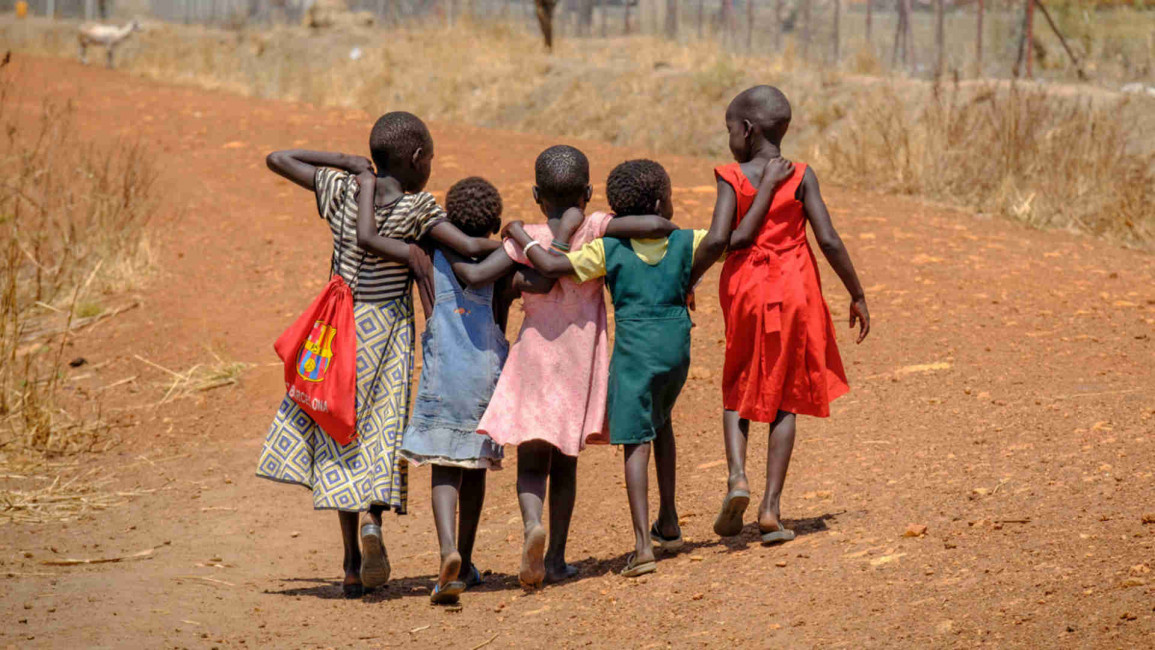One million children flee death in South Sudan
Of the 1.8 million refugees who arrived in neighbouring countries since fighting began, 62 percent are children.
More than 75,000 refugee children arrived at refugee registration centres in Uganda, Kenya, Ethiopia, Sudan and Democratic Republic of Congo without a family escort.
"No refugee crisis today worries me more than South Sudan," said Valentin Tapsoba, UNHCR's Africa Bureau Director.
"Refugee children are becoming the defining face of this emergency is incredibly troubling."
For children still living in South Sudan, the situation is grim.
Nearly three quarters of children are out of school, according to the UN statement, which is the highest out-of-school population in the world.
An official famine was declared in two counties of South Sudan in February, and hundreds of thousands of children are at risk of starvation in the absence of food aid.
 |
Children are also at risk of sexual harm, with increasing reports emerging of soldiers castrating young boys and raping underage girls |  |
The dangers to children
“The horrifying fact that nearly one in five children in South Sudan has been forced to flee their home illustrates how devastating this conflict has been for the country’s most vulnerable,” said Leila Pakkala, UNICEF’s Regional Director for Eastern and Southern Africa.
“Add this to the more than one million children who are also displaced within South Sudan, and the future of a generation is truly on the brink.
| The future of a generation on the brink: - Around 75% of the country's children are not currently going to school - the highest proportion of non-attendance in the world. - Children are at high risk of sexual harm, with increasing reports emerging of soldiers castrating young boys and raping underage girls. - A December report from UNICEF found that child soldier recruitment by government forces was increasing at alarming rates. |
|
"Since the first day of this conflict, children have been the ones most devastatingly affected by the violations," added Pakkala.
The recruitment of child soldiers is illegal in South Sudan and any person found engaged in the practice can technically be punished with imprisonment.
Civil war broke out for a second time in August 2016 following a second power struggle between President Salva Kiir and his former deputy Riek Machar.
Tens of thousands of people have died and more than 3.5 million have been displaced as a result of an ongoing conflict in the world's newest country.
A spokesperson for Machar's rebel army, the SPLA-IO, said his faction was looking for a "political solution" to the fighting.
"In the Greater Upper Nile, Greater Equatoria and Greater Bhar al-Gazal provinces – every community has fled their homes," William Gatjiath Deng told The New Arab.
"There is no food, no medicine and people are dying like birds – nobody cares for their lives."
 |
There is no food, no medicine and people are dying like birds – nobody cares for their lives |  |
The ongoing conflict has decimated food levels and has created famine in a number of regions across the country.
On Friday, an aid chief warned that six million lives were at risk if more was not done to fight the famine.
"If we don't do anything we're going to have six million people dead at the end of this year because of famine," said Saira Khan, CEO of the charity, Stop Hunger Now Southern Africa.
The UN has warned for months that a genocide status may be applied to South Sudan, as multiple reports suggest that government troops are responsible for ethnic cleansing.

![Minnesota Tim Walz is working to court Muslim voters. [Getty]](/sites/default/files/styles/image_684x385/public/2169747529.jpeg?h=a5f2f23a&itok=b63Wif2V)




![An Israeli air strike on Jabalia killed teenage journalist Hassan Hamad [Screengrab/X]](/sites/default/files/styles/image_330x185/public/2024-10/hassan%20hamad1.jpg?h=c12e0b96&itok=Rd_dyCVp)

![Israeli strikes on Beirut [Getty]](/sites/default/files/styles/image_330x185/public/2176155077.jpeg?h=a5f2f23a&itok=Xq7ypWgM)